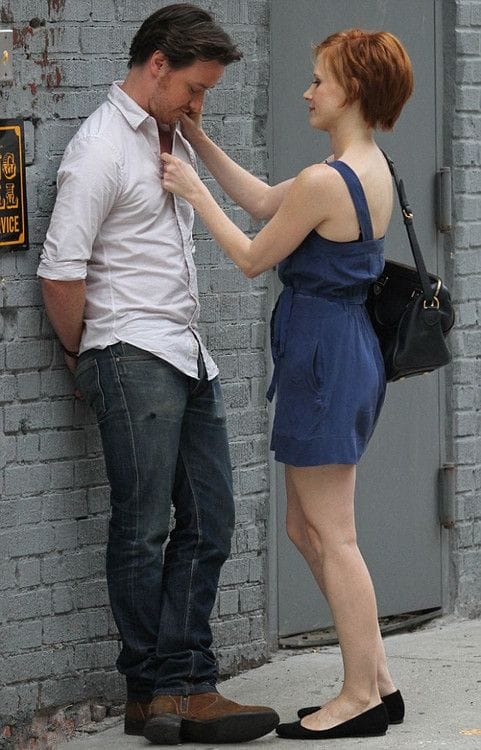Chastain and McAvoy Bring Star Power to First Film of a Trilogy

“The Disappearance of Eleanor Rigby” is about a man who loves a woman, and a woman who loves a man — so says the trailer. What sets this film apart from other dramas is that it’s a three-film drama told from three different perspectives: Eleanor Rigby (Jessica Chastain), Conor Ludlow (James McAvoy) and the objective omniscient. “The Disappearance of Eleanor Rigby: Them,” was first released Sept. 12, but viewers must wait another month to experience the love story from the independent perspectives of its two characters (“Disappearance: Her” and “Disappearance: Him,” which will have a limited release Oct. 10). “Disappearance” is an incredible attempt to examine the aftermath of a tragedy through the eyes of two different people, but it’s a logistically difficult task to pull off. The end of the first entry in the series left me unsatisfied, most likely because “The Disappearance of Eleanor Rigby: Them” does not, and cannot, delve deeply into either of the character’s psyches. It seems that the film attempts to tell us that there are two often irreconcilable sides to the same story with its ambitious format, yet makes it impossible to understand the full effect of this structure without seeing all three films.
Eleanor Rigby and Conor Ludlow are two married New Yorkers struggling to cope with the death of their child, but in two very distinct ways. Eleanor turns to attempting suicide and, after a failed attempt, proceeds to hide away with her parents. This prompts Conor to search high and low for his wife while simultaneously burying himself in his failing restaurant. Conor copes by throwing his son’s belongings into a closet. Eleanor struggles to understand Conor’s actions, and Conor defends his bizarre behavior by claiming that he has “moved on because moving forward was the only thing [he] could do.”
We are ushered into the movie with a cutesy scene of the two at the birth of their relationship while they dine and ditch at an upscale restaurant. The two are ridiculously happy at this point in the film and even make out for the first time in a public garden. This opening seems like the typical introduction to a romantic drama until the film takes us years into the future. After the death of their son, the two lovers have become married strangers, with Eleanor constantly on the run from Conor and Conor sunk in his failed parenthood, marriage, and career. Its beginning aside, the film lacks many of the traditional tropes used in romance movies. There is no montage of the two falling in love or out of love, no explanation of the tragedy, not even an image of their son — and for good reason. The film deftly portrays the aftermath of a tragedy with its exclusion of a backstory, and we are left simply with a feeling of loss, without understanding how or why it came — much like the characters. “I forgot what he looked like,” Eleanor explains at the movie’s end. To punctuate this physical and mental loss, we see only a fuzzy outline of the child that once was.
Unfortunately, the film is weakened by an overuse of dramatic one-liners, including, but not limited to: “There’s only one heart in this body — have mercy on me,” “I don’t really know you” and “Do you have a destination?” These are lines that would have impact when used sparingly, but that become tiresomely sentimental after multiple instances. Although Chastain and McAvoy perform brilliantly, the characters themselves are flawed. Conor is too predictably hotheaded and Eleanor is always searching for herself in the most stereotypical ways. Throughout the film, she re-enrolls in school, moves in with her parents and she even runs away to Paris, because who hasn’t done that before?
Nevertheless, with its appropriately melancholic soundtrack, brooding cinematography, and powerful acting, “The Disappearance of Eleanor Rigby: Them” is a sad, beautiful film, about the inability of a couple to “return to where [they] once were” despite a love that persists. Conversations between Conor and his college-buddy/employee Stuart (Bill Hader) are a welcome respite from the film’s uncomfortable attempts at sincerity. Similarly, Eleanor’s professor, played by Viola Davis, is a breath of fresh air during her appearances onscreen. But without watching the next installments of the trilogy, I am unable to fully assess the effect of the project. “Them” superficially delves into Conor’s ego and strained relationship with his wealthy father and into Eleanor’s attempts to “find a different version of [her]self.” Perhaps “Them” makes a statement with such surface-level scenes: that we cannot truly understand two people by pure, unbiased observation, and that, in fact, we all seem like clichés at first glance.




Comments ()